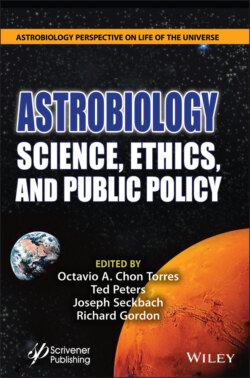Читать книгу Astrobiology - Группа авторов - Страница 2
Table of Contents
Оглавление1 Cover
2 Title Page
3 Copyright
4 Foreword
5 Preface
6 1 Astrobioethics: Epistemological, Astrotheological, and Interplanetary Issues 1.1 Introduction 1.2 Epistemological Issue 1.3 Astrotheological Issue 1.4 Interplanetary Issue 1.5 Conclusions References
7 2 Astroethics for Earthlings: Our Responsibility to the Galactic Commons 2.1 Introduction 2.2 Laying the Foundation for an Astroethics of Responsibility 2.3 Astroethical Quandaries Arising Within the Solar Neighborhood 2.4 Levels of Intelligence in the Milky Way Metropolis 2.5 Conclusion References
8 3 Moral Philosophy for a Second Genesis 3.1 Moral Philosophy on Earth and Elsewhere 3.2 Identifying the Lack of Ethical Substance in Science Communication 3.3 Going from Astrobiology to Astrobioethics: A Big Step for Science and Humanism 3.4 Would There Be New Ethical Principles if There Were a Second Genesis? 3.5 Astrobioethics is Subject to Constraints on Chance 3.6 How Are We Going to Treat Non-Human Life Away from the Earth? 3.7 Ethical Principles in Early Proposals for the Search for Non-Human Life in the Solar System 3.8 Conclusion Glossary References
9 4 Who Goes There? When Astrobiology Challenges Humans 4.1 Introduction 4.2 The Copernican Revolution 4.3 Religious Reactions to the Copernican Revolution 4.4 Astrobiology and Speculation 4.5 Heretics 4.6 The Many Worlds Hypothesis 4.7 Desecration of Planets Beyond Earth 4.8 The Precautionary Principle 4.9 The Sacred Beyond Earth 4.10 Who Goes There? 4.11 Conclusion: The Astrobiological Apocalypse Further Readings
10 5 Social and Ethical Currents in Astrobiological Debates 5.1 Introductory Musings 5.2 Uncertainty Opens the Door 5.3 Time Frames 5.4 Conceptual Frames 5.5 Complications, Connections, and CYA 5.6 A Concluding Thought References
11 6 The Ethics of Biocontamination 6.1 The Beresheet Tardigrades 6.2 Our Conflicting Intuitions 6.3 The Intelligibility of Microbial Value 6.4 Contamination and Discovery 6.5 Conclusion References
12 7 Astrobiology Education: Inspiring Diverse Audiences with the Search for Life in the Universe 7.1 The State of Astrobiology 7.2 Astrobiology as a Profession 7.3 Graduate Programs 7.4 Undergraduate Programs 7.5 Conferences and Schools 7.6 Courses for Non-Science Majors 7.7 Massive Open Online Classes 7.8 Teaching Materials and Books References
13 8 Genetics, Ethics, and Mars Colonization: A Special Case of Gene Editing and Population Forces in Space Settlement 8.1 Introduction 8.2 Population Forces and the Ethical Issues They Raise 8.3 Ethical Issues Implied by Population Forces and Genome Modification 8.4 Case Types for Off-World Population Change and Their Ethical Implications 8.5 Religious Ethics and Population Forces 8.6 Conclusions Acknowledgement References
14 9 Constructing a Space Ethics Upon Natural Law Ethics 9.1 Introduction 9.2 Space Ethics and Natural Law Ethics 9.3 A Natural Law Ethics Including Space 9.4 The Disadvantages, Ambiguities, and Advantages of a Natural Law Space Ethics 9.5 Conclusion References
15 10 Two Elephants in the Room of Astrobiology Abbreviations 10.1 Identifying the Two Elephants 10.2 The Phenomenon Elephant 10.3 The Weaponization Elephant 10.4 U.S. Government Spending on Weapons for Space 10.5 The Military-Industrial Complex Operates Under Euphemisms Citing “Government-Industry” Linkages 10.6 How the Two Elephants Are Connected 10.7 The Astroethics Public Policy Path Forward References
16 11 Microbial Life, Ethics and the Exploration of Space Revisited 11.1 Introduction 11.2 Critiques of Intrinsic Value 11.3 What of Intrinsic Value? 11.4 Adjudicating Other Interests 11.5 Do We Need a Cosmocentric Ethic for Microbial-Type Life? 11.6 Conclusions References
17 12 Astrobiology, the United Nations, and Geopolitics 12.1 Introduction 12.2 What is Astrobiology? 12.3 Ethical Issues in Astrobiology 12.4 Astrobiology and Planetary Protection 12.5 Conflicting Ideologies 12.6 International Cooperation—or Not? 12.7 Conclusions References
18 13 An Ethical Assessment of SETI, METI, and the Value of Our Planetary Home 13.1 A Brief History of SETI and METI 13.2 Ethical Analyses of SETI and METI 13.3 Ethical Proposals for the Road Ahead References
19 14 The Axiological Dimension of Planetary Protection 14.1 Introduction 14.2 The Relation Between the Epistemic and the Axiological Dimensions of Planetary Protection 14.3 The Axiological Dimension of Planetary Protection Today 14.4 The Nature of Epistemic Values 14.5 The Outer Space Treaty and the Axiological Dimension of Planetary Protection 14.6 The Axiological Dimension of Planetary Protection – Historical Background 14.7 Ethics and Planetary Protection 14.8 Competing Values – Planetary Protection and the Commercial Use of Space 14.9 Conclusions References
20 15 Who Speaks for Humanity? The Need for a Single Political Voice 15.1 Introduction 15.2 The Need for Global Decision-Making in an Astrobiological Context 15.3 Some Socio-Political Implications of Astrobiological Perspectives 15.4 Who Speaks for Humanity? Building Appropriate Political Institutions for Space Activities 15.5 Conclusions References
21 16 Interstellar Ethics and the Goldilocks Evolutionary Sequence: Can We Expect ETI to Be Moral? 16.1 Introduction 16.2 Astronomical Detection of Possible Life 16.3 Operationalizing Human Neurological Features for an ETI Vetting Protocol 16.4 Fictional Case Studies of Vetting ETIs 16.5 Conclusion References
22 17 Intrinsic Value, American Buddhism, and Potential Life on Saturn’s Moon Titan 17.1 Introduction 17.2 Titan and Possible Weird Life 17.3 Some Strengths and Limitations of the Intrinsic Value Concept 17.4 Buddhist Scriptures and the Search for Extraterrestrial Life 17.5 American Buddhists and Life on Titan 17.6 Discussion 17.7 Conclusion References
23 18 A Space Settler’s Bill of Rights 18.1 Introduction 18.2 Basic Physiological Needs 18.3 Physical and Psychological Well-Being 18.4 Freedom of Expression 18.5 Privacy 18.6 Reproductive Autonomy 18.7 Vocational and Educational Liberty 18.8 Communication 18.9 Constrained Dissent 18.10 Self-Governance and Revisability 18.11 Conclusion References
24 Index
25 End User License Agreement
